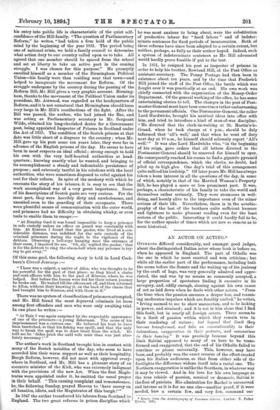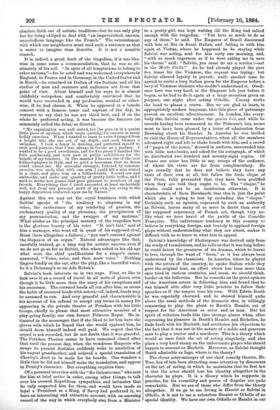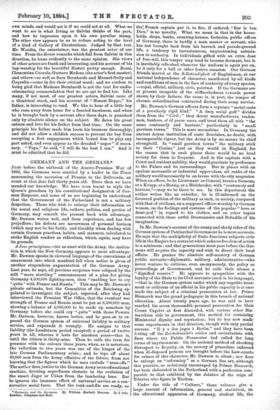AN ACTOR ON ACTING.*
OPINIONS differed considerably, and amongst good judges, about the distinguished Italian actor whose book is before us, when he appeared in England. The part of Othello was the one in which he most courted and won criticism ; but while all the earlier part of the performance, including both the scene before the Senate and the waking up of his jealousy by the craft of Iago, was very generally admired and appre- ciated, the end was by no means so commonly accepted, a. large proportion of spectators finding it excessive in its savagery, and, oddly enough, sinning against his own canon of art as laid down when he deals with other actors. "From the time when the passion assumes a deeper hue, and reason- ing moderates impulses which are forcibly curbed," he writes, "Irving seemed to me to show mannerism, and to be lacking in power, and strained ; and it is not in him alone that I find this fault, but in nearly all foreign actors. There seems/ to be a limit of passion within which they remain true in their rendering of nature ; but beyond that limit they become transformed, and take on conventionality in their intonations, exaggeration in their gestures, and mannerism. in their bearing." It was precisely because beyond this limit Salvini appeared to many of us here to be trans- formed and exaggerated, that the end of his Othello failed to convince or please universally. This, however, may have been, and probably was, the exact reverse of the effect created upon his Italian audiences, so that from either side of the footlights the difference widens itself into a racial one. The Northern exaggeration is unlike the Southern, in whatever way it may be viewed. And in his love for his own language as the true vehicle of passion, musical or dramatic, Salvini is the first of patriots. His admiration for Rachel is unreserved and intense as it is for no one else—another proof, if it were needed, how a certain few, and very few, command our • Leares from the Autobiography of Tommaso Salvini. Lonlou T. Fisher Unwin. 1E92.
absolute faith out of artistic tradition—but he can only pity her for being obliged to deal with "an impoverished, uneven, ianmelodious language like the French." The astonishment with which our neighbours must read such a sentence as that is easier to imagine than describe. It is not a sensible remark.
It is, indeed, a great fault of the tragedian, if it was like- wise in some sense a recommendation, that he was so ob- stinately of his soil. "In spite of all temptations to belong to other nations,"—for he acted and was welcomed everywhere in England, in France and in Germany, in the United States and in Brazil,—he remained an Italian of the Italians, and all his studies of men and manners and audiences are from that point of view. About himself and his ways he is almost childishly outspoken, and comfortably convinced that he would have succeeded in any profession, musical or other- wise, if he had chosen it. When he appeared at a benefit concert with a famous tenor and soprano of the day, he ventures to say that he was not third best, and if on the whole he preferred acting, it was because the finances (so 'commonly called the fates) so directed.
" My organisation was well suited, too [he goes on in a quaint little piece of egotism which bears quoting] for success in many bodily exercises. When I wanted to learn to swim I jumped from a height into the sea out of my depth, and soon became a swimmer. I took a fancy to dancing, and perfected myself to such good purpose, that I was always in favour as a partner. I wanted to be a good swordsman, and for five years I handled the foils assiduously, and took part in public exhibitions for the benefit of my teachers. In like manner I became one of the best billiard-players in Italy, and so gdod a horseman that no horse could unseat me. My muscular strength, fostered by constant exercise, was such, that with one arm I could lift a man seated in a chair, and place him on a billiard-table. I could sew and .embroider, and make any quantity of pretty little trifles, and I used to devise new games that gave pleasure to numbers of my friends. Everything that I tried succeeded at least moderately well, not from any personal merit of my own, but owing to the happy disposition conferred upon me by Nature."
Against this we may set the equal frankness with which Salvini speaks of "the tendency to singsong in my voice, the exuberance of my rendering of passion, the exclamatory quality of my phrasing, the precipitation of my pronunciation, and the swagger of my motions." What abides as the principal memory of the tragedian here is the glorious beauty of his voice. "It isn't fair," said of him a manager, who went off in quest of his supposed rival, Rossi (here altogether a failure) ; "you can't contend against the diapason of an organ." Natural advantages like that, carefully trained, go a long way for artistic success, even if we do not go so far as Rubini, who, when asked in his old age what were the chief qualifications for a singer's career, answered, "Voice, voice, and then more voice." Nothing lingers fondly on the ear, after the play, like a beautiful voice, be it a Delaunay's or an Ada Rehan's.
Salvini's book interests us in two ways. First, we like to look over it as a record of travel in all sorts of places, even though it be little more than the story of his receptions and his successes. The crowned heads all ran after him, as seems the habit of crowned heads with actors,—if, indeed, heads may be assumed to run. And very graceful and characteristic is his account of his refusal to accept any terms in money for appearing in the private theatre at Potsdam with his little troupe, chiefly to please that most attractive member of a pky-going family, our own former Princess Royal. He in- timated to the messenger that if she liked to let him have the gloves with which he hoped that she would applaud him, he should deem himself indeed well paid. We regret that the sequel is not recorded, but do not doubt that it was graceful. The Potsdam Theatre seems to have remained closed after -that until the present day, when the wondrous Emperor who sways its present destinies suddenly woke to emulation of his august grandmother, and ordered a special translation of Char/ey's Aunt to be made for its boards. One wonders a little that he did not himself make the translation, and appear in Penley's character. But everything requires time.
Of a personal interview with the "Re Galantuomo," who sent for him at brief notice in order, among other things, to talk over his avowed Republican sympathies, and intimates that he only respected him for them, and would have made as loyal a President as a King, if Savoy had preferred it, we have an interesting and attractive account, with an amusing record of the way in which everybody else, from a Minister to a pretty girl, was kept waiting till the King had talked enough with the tragedian. "You have as much to do as
any of them," he said. The Emperor of Brazil discoursed with him at Rio in fluent Italian, and falling in with him again at Vienna, where he happened to be staying while Salvini was acting, sent for him early one morning, and, "with as much eagerness as if he were asking me to save his throne" said: "Salvini, you must do me a service !—act in the Marie Civile." As he had already played the part five times for the Viennese, the request was trying ; but Salvini allowed loyalty to prevail ; while another time he agreed to recite a long Italian poem for the Emperor before a bevy of Viennese students who couldn't understand it. Obedi- ence here was very hard, as the Emperor left just before it began, so he had to do it again at a large reception given on purpose, one night after acting Othello. Uneasy works the head to please a crown. But we are glad to learn, in appropriately modern language, that this piece of patronage proved an excellent advertisement. In London, like every- body else, Salvini came under the genius loci, and while he records having been summoned to the Princess's box, seems most to have been pleased by a letter of admiration from Browning about his Hamlet. In America he was invited to visit the House of Representatives, when all the members advanced right and left to shake hands with him, and a crowd of "pages of the house," dressed in uniform, surrounded him with little note-books, and asked for his autograph, of which he distributed two hundred and seventy-eight copies. Of France our actor has little to say, except of the audience, of whom his views are far from complimentary. He says roundly that he does not believe they have any taste of their own at all, but follow the little clique of the Press, fully persuaded that they have been gratified when they are told they ought to be. The "claque," he thinks, could not be an institution otherwise. It is characteristic of Sara Bernhardt, that this is just the point which she is trying to test by excluding the "claque." Certainly such an opinion, expressed by such an authority as Salvini, leaves many of us more in doubt than ever of the supposed supremacy of French art, though very un- like what we have heard of the public of the Comedie Francaise. The unfortunate tendency in this country to believe in everything foreign, and bravely to applaud foreign plays without understanding what they are about, makes it difficult with us to know to what test to appeal.
Salvini's knowledge of Shakespeare was derived only from the study of translations, and he tells us that it was long before he could detect the greatness of his dramas, which he learnt to love, through the want of "form," as it has always been understood by the classicists. In America, where he played with the actors of the country, he spoke Italian while they gave the original text, an effect which has been more than once tried in various countries, and must, we should think, border on the ludicrous. But he remarks on the great aptness of the American actors in following him, and found that he was himself able after very little practice to follow their speeches as if the tongue were his own. With Edwin Booth he was especially charmed, and he showed himself quite above the usual methods of the dramatic star, in willingly consenting to play the ghost to Booth's Hamlet, out of respect for the American as actor and as man. But his spirit of criticism leads him into strange places when, after expressing his pleasure in Booth's Hamlet and Richelieu, he finds fault with his Macbeth, and attributes his objections to the fact that it was not in the nature of a noble and generous man to play a traitor and a murderer. This is a theory which would at once limit the art of acting singularly, and also place a very hard stamp on the unfortunate player who should happen to succeed as Macbeth. Moreover, as Salvini thought Booth admirable as Iago, where is the theory?
The clever actor-manager of our chief comedy theatre, Mr. Tree, has of late been attracting some attention by discourses on the art of acting, in which he maintains that its first law is that the actor should lose his identity altogether in the character he plays. It is a theory which he supports in practice, for his versatility and power of disguise are quite remarkable. But we are of those who differ from the theory altogether. If we go to see Irving in Hamlet or Salvini in Othello, it is not to see a colourless Hamlet or Othello of no special identity. We have our own Othello or Hamlet in our
own minds, and would act it if we could act at all. What we want to see is what Irving or Salvini thinks of the part, and how he impresses upon it his own peculiar stamp. The other view appears to us to reduce acting to the level of a kind of Gallery of Illustrations. Judged by that test, Mr. Woodin, the entertainer, was the greatest actor of our time. From the divers remarks which fall from Salvini in this direction, he leans evidently to the same opinion. His views of other actors are frank and interesting, and his account of his boy-worship for the beautiful Ristori pretty enough. Rossi, Clementine Cuzzola„ Gustavo Modena (the actor's first master), and others—as well as Sara Bernhardt and Mounet-Sully and Coquelin—come in for their critical word; and we confess to being glad that Madame Bernhardt is not the text for undis- criminating commendation that we are apt to find her. Like many, if not most, of our greatest actors, Salvini came of a theatrical stock, and his account of "Honest Beppo," his father, is interesting to read. We like to hear of a little boy who runs away from home for a fancied harshness, and when he is brought back by a servant after three days, is punished only by absolute silence on the subject. He dates his great esteem and love for his father from that time. On the same principle his father made him learn his business thoroughly, and did not allow a childish success to prevent the boy from accepting a first engagement which bound him to play any part asked, and even appear as the dreaded " super " if neces- sary. "Papa," he said, "I will do the best I can." And it must be admitted that he did.








































 Previous page
Previous page